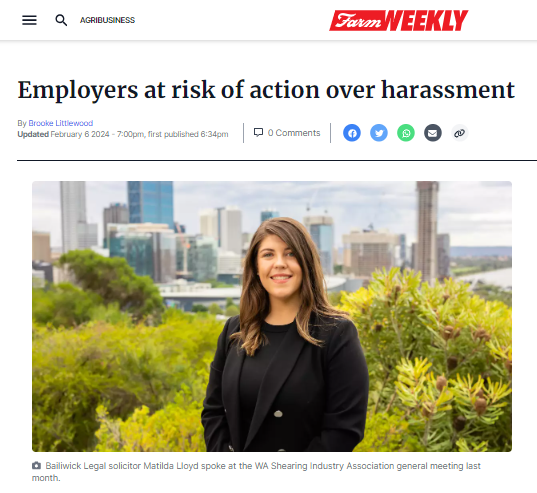Is your wealth protected – Divorce and separation (by FMD Legal)
The sting of separation and divorce has no equal.

There are thousands of quotes that encapsulate the financial consequences of divorce, and none more brutally honest than:
- “Divorce is the one human tragedy that reduces everything to cash”. Rita Mae Brown; and
- “Divorce looks like one of the fastest ways to destroy your wealth”. Jay Zagorsky
Married couples in Australia have a 40 to 50 percent chance of divorcing. The latest data published by the Australian Bureau of Statistics shows that:
- in 2018, there were 119,188 marriages registered and 49,404 divorces granted; and
- the median duration from marriage to divorce was approximately 12.3 years.
The data does not capture:
- married couples that separated but elected not to divorce; and
- the number of de facto relationships commenced and brought to an end.
The reality is that divorce (separation for de facto couples) has a real and detrimental impact on wealth. Those that fall in the above statistics are left exposed. What can they and their families do about it?
Protecting your wealth against divorce or separation
There are several mechanisms that can be utilised to protect wealth under federal and state laws.
In the context of separation and divorce, one such mechanism is a financial agreement, more commonly referred to as a pre-nuptial agreement.
Although nearly two decades have passed since the inception of financial agreements in Australia, they remain an underutilised asset protection and estate planning mechanism.
Consequently, men and women fail to protect or conserve their hard-earned wealth, and that of their families, when divorce or separation befalls them in the absence of a financial agreement.
Characteristics of Financial Agreements
What does a financial agreement do?
A financial agreement ousts the Family Court’s power to determine property settlement and maintenance disputes between married and de facto couples.
In the absence of a financial agreement, the Court’s power to determine the couple’s affairs is engaged when one of them makes a competent application regarding:
- the division of the couple’s wealth (“property settlement”); and
- the maintenance of members of the couple, including their current or future children (“maintenance”).
The Court’s reach is not limited to the wealth of the couple. It can extend to the wealth of related and unrelated third parties, such as family members, business partners and their respective entities. This is because the Court has the power to divest third parties of their rights in specific circumstances.
Commonly, a member of the couple in such disputes, asserts that assets, or a portion of them, held by a third party are, for all intents and purposes:
- owned by one or both parties;
- held on trust for one or both parties;
- has historically been a financial resource for the couple; and
- will be, or continue to be, a financial resource for the other member of the couple.
In some cases, neither member of the couple may have made any measurable or discernible contributions to the acquisition, improvement or maintenance of the wealth of third parties, the subject of the dispute.
Parties seeking to avoid the above, and achieve certainty or asset protection, should enter into financial agreements so that they oust the Court’s abovementioned power. This can be done at any point prior to, during or after marriage (or a de facto relationship).
Consequently, financial agreements are a critical component to asset protection and estate planning. They manage risk when effectively used and fend off challenges from others.
For example:
- where parents wish to transfer their wealth to their child and/ or grandchildren, without losing it to someone outside that group. The parents could require, without duress, pressure or acting unconscionably, their child and significant other to enter into a financial agreement prior to marriage, commencing a de facto relationship and, importantly, the proposed transfer of wealth.
- where former spouses or partners with complex financial structures, for their mutual benefit, remain tied together, and one or both parties enter new relationships (introducing blended families). The former spouses can protect their joint wealth by entering into financial agreements with their new partners.
The requirements of a financial agreement?
A financial agreement must be in writing, made between parties and deal with:
- how the current or future wealth of both parties is to be dealt with. For example:
(a) assets and resources brought into the relationship by the parties;
(b) inheritances; and
(c) assets and resources emanating from third parties such as intergenerational assets/ businesses.
- how the current or future maintenance of the parties or their children will be catered for; and
- any other matter incidental or ancillary to maintenance or wealth of the parties.
Accordingly, couples can agree, record and predetermine their financial outcomes without the intervention of the Court.
When is a financial agreement binding?
For a financial agreement to be binding (under Commonwealth legislation), the following must be satisfied:
- before signing the agreement, the parties must receive specific independent legal advice about the financial agreement;
- either before or after signing the agreement, the parties must receive a signed statement from their respective lawyers stating that the advice referred to above was provided;
- the parties must exchange the said statements; and
- The agreement must not been terminated or set aside by the Court.
Can financial agreements be changed?
A financial agreement cannot be changed unless:
- the parties agree to:
(a) terminate the original by executing a termination agreement. The power of the Court to determine property and maintenance disputes is thereafter revived; or
(b) execute a new financial agreement which contains a clause terminating the original.
Notably, parties that enter into a financial agreement solely under Western Australian legislation and never intend to marry, but subsequently marry, need to be aware that their agreement terminates upon marriage.
If they still require the protection of a financial agreement, they should enter into an agreement under Commonwealth legislation and, advisedly, well prior to their marriage.
Can financial agreements be set aside?
The Court can set aside a financial agreement upon application in limited circumstances, including where:
- the agreement was obtained by fraud;
- the agreement is void, voidable or unenforceable. Where a party has been subjected to:
(a) duress;
(b) undue influence; or
(c) unconscionable conduct.
- it is impracticable for the agreement, or a part of the agreement, to be carried out; or
- The purpose of the agreement was to defraud or defeat creditors.
Expert advice
Financial agreements must be drafted with the utmost care and in accordance with the requirements of the law.
It is only in those circumstances that financial agreements achieve their intended goal of ousting the Court’s power and consequentially facilitating effective estate planning and protecting wealth.
In addition to financial agreements, parties must execute other documents that work harmoniously with financial agreements such as Wills, enduring powers of attorney and commercial agreements in relation to the operation of intergenerational assets such as farms and businesses.
The content of this article is a brief summary and overview only. It does not constitute legal advice. Accordingly, you must seek legal or other professional advice before acting or relying on any of the content.



Working with you, working for you
Bailiwick Legal | Disclaimer | Privacy Policy.










